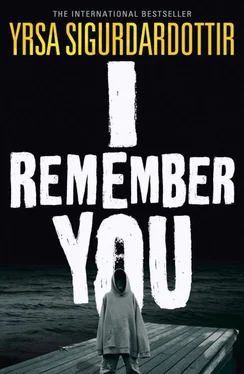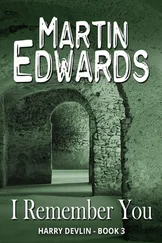They rounded the corner of the house to the gable end, facing away from the village. Freyr stopped as his torch beam revealed signs of an excavation. In the darkness he could make out the upper part of what had to be the septic tank, along with the little riser on top of it. Freyr walked slowly over to it, having to remind himself to breathe. The closer he got, the more the green colour stung his eyes, the colour that had plagued him both awake and asleep. When he reached the edge of the dug-up area he saw the tank in its entirety, though the lower part of it was covered in snow. A submarine. A green submarine. If he squinted, he had no trouble seeing the resemblance. A broad, cylindrical body with a little house on top; the only thing missing was the periscope. ‘Hold on a second, Freyr. I’ll have a look inside.’ Dagný pushed him back from the edge. ‘Don’t fall in. You could twist your ankle or something even worse.’ It wasn’t a long fall, but Freyr knew she was right. He wouldn’t even raise his hands to stop his fall in the condition he was in now. So he watched her step into the hole, clamber up onto the tank and inch her way towards the opening through which Benni must have entered. She easily unhitched the latch holding the lid tight and once again Freyr felt a sting in his heart; in all likelihood, the man whose car Freyr had hit had noticed that it wasn’t fastened before he drove off, and secured it. Yet another ‘what if’ to add to the list. What if he hadn’t done that? Would Benni have managed to open the lid from the inside and stick his head out? Would other drivers have seen him and stopped the car?
Dagný put the lid down and shone her torch into the little tank. At that, the empty space inside became like a lantern; the green light not unlike the borealis. Inside the tank a shadow appeared. The pain was worse than he could ever have imagined; it was like standing near to a huge fire, except that it burned inside him and it was useless to turn away. To Freyr it looked as if a tiny, skeletal hand formed part of the outline. Benni.
The sea did what it could to make Freyr’s trip home even more unbearable. His stomach moved in tandem with every dip and rise of the boat, but his body was unable to relieve his discomfort by vomiting. He sat on a bench in the little passenger area behind the pilothouse and stared out. Although his eyes could see what was in front of him, his brain wasn’t able to put together the information; he would have had trouble describing what he saw. Líf was dead; she’d passed away shortly after they sailed out into the Ísafjörður Deep; she’d asked for a cigarette, sighed softly, and then her head sank slowly to the side. His attempts to resuscitate her had been useless. Feeling her lips against his once more under these circumstances, lifeless as they were, had been almost too much for him.
‘Freyr.’ Dagný sat crouched in front of him. ‘We’re just about there. How do you feel?’
‘All right.’ This was a lie, clear to both of them.
‘Your son will be brought back first thing in the morning. I’ll see to it.’ He didn’t reply, since it wasn’t necessary. ‘I looked in the bag. It belonged to Bernódus.’ A large, powerful wave nearly toppled her over, but Dagný managed to keep her balance by grasping Freyr’s knees. ‘The contents are practically undamaged and I found a notebook that he wrote in after he went missing.’ He didn’t react, and she continued: ‘In it he describes what happened to him. It’s pretty shocking. I’ll have it photocopied for you later if you want.’
Freyr nodded. Maybe he would read it, maybe not. At the moment he just wanted to be alone. Completely alone. He no longer felt Benni’s presence and he was fairly certain that the boy would no longer appear in Sara’s dreams. He couldn’t avoid the thought that in the end she would miss it. Just as he did already.
Úrsúla wept silently. The salty tears flowed over the wounds beneath her eyes, still unhealed. It must have hurt, but she didn’t show it. ‘He’s gone.’ She rubbed her veiny hands. ‘He isn’t here any longer.’
‘Is this an accurate description of what happened, Úrsúla? Do you remember it?’ Freyr put down the paper from which he’d been reading aloud. He’d got it from Dagný the day after they’d returned from Hesteyri, having contacted her first thing the next morning after a sleepless night. He’d wanted to read it before she returned to Hesteyri with back-up to search for the missing couple and transport the physical remains of both Benni and Bernódus back to town. Unfortunately the search had been postponed by a day because of bad weather and so the group was there now, probably working diligently to complete their mission before darkness fell. He hoped they would show his son respect and handle his little white bones gently; he would have preferred to be able to deal with them himself and had tried to go with them, had done everything but fall to his knees and beg Dagný, but to no avail.
‘They didn’t want to be my friends; they just pretended to be. After Bernódus disappeared they treated me as they had before. Cruelly.’ She twisted her hands together more fervently, as if trying to plait her fingers. ‘He was my only friend and they made me betray him – tricked me into thinking I could be part of their group. The popular ones. The pretty ones.’ Her hands stopped moving. ‘They didn’t mean it; they lied. When he was gone everything went back to the way it had been.’
Freyr didn’t know what to say. He hadn’t read the complete text to her; he’d left out the final statement, where the boy vowed revenge, asking whoever found the text to see to it that they all, but particularly Úrsúla, got their just reward. It had certainly come true; all the kids that he’d named had suffered as adults, and the teacher who had turned a blind eye to his problems was the first to suffer. The father was the only one the boy had spared, which was typical of a child’s loyalty to his parents. But apart from the avenging spirit and the fury of a dying child, which the handwritten text described, the resemblances to Benni’s fate were striking. So striking that Freyr couldn’t bring himself to think about them, not immediately. Perhaps he would do it later, after reconciling himself to his life again, which at the moment seemed like a distant dream. ‘Kids can be so ruthless, Úrsúla. But they grow out of it. Who knows, maybe you would have become friends again if you hadn’t got ill and moved to Reykjavík.’
‘I should have told someone about it. I just didn’t dare. They threatened to beat me up, tell the police that I was responsible for it, not them. Who would have believed me against all of them?’
Freyr prepared to leave, folding the paper and tucking it into Úrsúla’s medical history file, which he had with him. The story of Bernódus, kept with ECG readouts and descriptions of drug dosages for an old woman who had long since lost her grasp on what was considered reality – perhaps not surprisingly. Undoubtedly her disturbed mind had had trouble coping with what had happened. Watching her new companions bully and tease a boy who had given her his friendship, calling him awful names, saying that he was ugly and dirty, the insult they chose for him because he never wanted to have a shower after P.E. But now they’d found something new to tease him with. They mocked him for being so poor that his dad couldn’t afford crosses for the graves of his mother and brother, and had to carve them on his son’s back. When he tried to flee their taunts they followed him, chasing him down to the harbour where he found himself at a dead end, with his best option for getting out of it to clamber on board a boat that was releasing its moorings. The group of kids had stood at the end of the pier and watched the boat sail away, while the boy hid beneath a sailcloth and tangled mess of netting for fear that the sailor would see him, return to the pier and leave him there. From his description, what had hurt him the most was looking out from his hiding place at Úrsúla standing among his tormentors, and having to face the fact that she was a willing participant in their teasing and wasn’t going to do anything to help him.
Читать дальше










